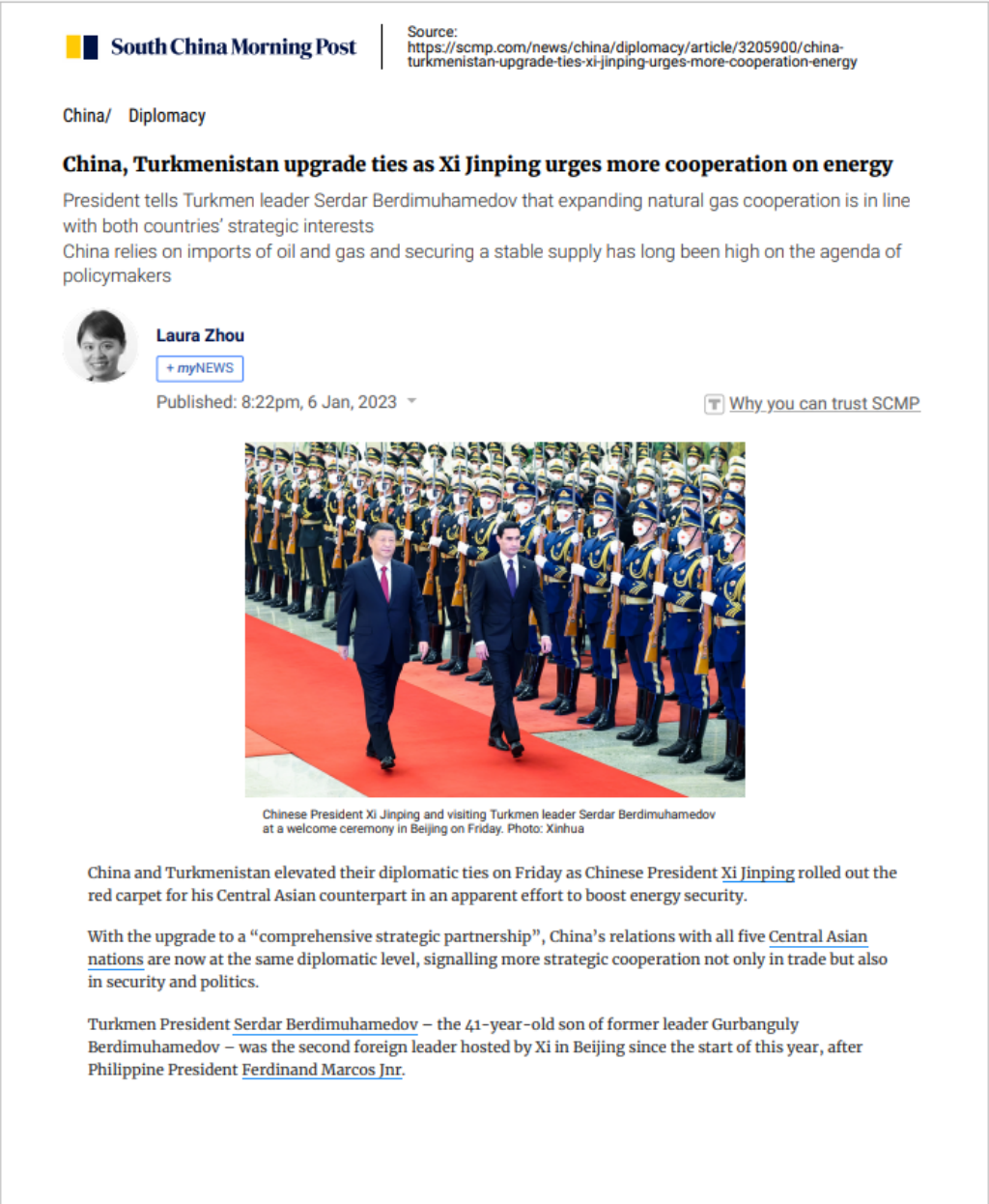2023年1月6日,兰州大学土库曼斯坦研究中心主任王四海教授就土库曼斯坦总统谢尔达尔·别尔德穆哈梅多夫访华接受《华南早报》采访,相关报道如下:



China, Turkmenistan upgrade ties as Xi Jinping urges more cooperation on energy
President tells Turkmen leader Serdar Berdimuhamedov that expanding natural gas cooperation is in linewith both countries’ strategic interests
China relies on imports of oil and gas and securing a stable supply has long been high on the agenda ofpolicymakers
China and Turkmenistan elevated their diplomatic ties on Friday as Chinese President Xi Jinping rolled out thered carpet for his Central Asian counterpart in an apparent effort to boost energy security.
With the upgrade to a “comprehensive strategic partnership”, China’s relations with all five Central Asiannations are now at the same diplomatic level, signalling more strategic cooperation not only in trade but alsoin security and politics.
Turkmen President Serdar Berdimuhamedov – the 41-year-old son of former leader GurbangulyBerdimuhamedov – was the second foreign leader hosted by Xi in Beijing since the start of this year, afterPhilippine President Ferdinand Marcos Jnr.
During their meeting at the Great Hall of the People, Xi emphasised the two countries’ “shared vision, similargoals and linked interests”.
“China and Turkmenistan should join hands and work together … to bring into play our complementaryadvantages, explore the potential for cooperation and achieve common development,” Xi toldBerdimuhamedov, according to a readout from the Chinese foreign ministry.
The Turkmen leader’s visit comes as major economies, especially those in Europe and East Asia, are grapplingwith an energy shortage sparked by Russia’s invasion of Ukraine last February, raising fears of a globaleconomic contraction this year.
Securing a stable energy supply has long been high on the agenda of policymakers in China, which has reliedon imports of oil and gas to fuel the world’s second-largest economy.
On Friday, Xi told Berdimuhamedov that the two countries should “prioritise energy cooperation”.
“Natural gas cooperation is the cornerstone of bilateral relations,” Xi said. “And expanding cooperation onnatural gas is in line with the strategic and long-term interests of both countries.”
Xi said efforts should be made “steadily” to explore new ways to boost bilateral economic cooperation. Headded that Chinese companies were encouraged to invest in Turkmenistan.
In response, Berdimuhamedov, who took office in March, said Turkmenistan “shares similar views with Chinaon many international and regional issues and is ready to increase mutual support and work more closely withChina”, according to the readout from the Chinese ministry.
He also said Turkmenistan was “fully supportive” of the China+Central Asia mechanism. Also known as C+C5,the mechanism was launched last year and is widely seen as a Beijing-led effort for more strategiccoordination with Central Asia over issues such as the Afghanistan crisis and the war in Ukraine.
The two countries are connected by the 1,830km (1,140-mile) Turkmenistan-Uzbekistan-Kazakhstan-Chinagas pipeline, through which more than 350 billion cubic metres of clean-burning fuel has been transferred toChina since 2009.
Strengthening the relationship with China was also on Berdimuhamedov’s agenda – he has been seeking todiversify export markets for Turkmenistan’s natural gas, the “backbone” of its economy.
More than 60 per cent of Turkmenistan’s foreign revenues come from gas exports and China is its largestmarket.
Wang Sihai, director of the Centre for Turkmenistan Studies at Lanzhou University, said the move to elevateties signalled that there was more political trust between the two countries.
“China needs natural gas from Turkmenistan because it is accessible and affordable and can be transferred toChina, while the Chinese market is the most stable one,” Wang said.
“Natural gas has been central to bilateral relations between China and Turkmenistan, and future cooperationwill go beyond gas exports.”